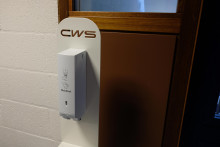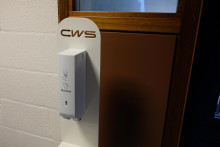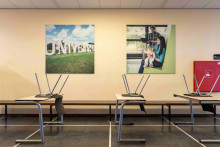These days are undoubtedly hectic for your department.
Lasonder: ‘That’s true. Everyone at the UT is making the switch to working digitally. It takes some getting used to for many people to suddenly switch from physical meetings to meetings via Skype for Business or BlueJeans. However, we generally notice a steep learning curve; most people get used to this type of software very quickly.’
Can the network handle this?
‘At a national level, it will be interesting to see if the national infrastructure can handle it. We also notice a difference in our network flows at the UT. In the near past, these were mainly on campus, nowadays from the outside towards the campus. As a result, we needed more capacity for our VPN network, which has been experiencing occasional issues in recent days. But I generally have the impression that things are going well, hence the measure to close buildings. Even though we are still in a pilot phase with Microsoft Teams, for example, we notice that more people are making use of this software.
Next week it will be especially tense when the lectures – as far as possible – take place online. We are not only dealing with our own digital infrastructure, but also with that of external suppliers such as Canvas. We are in good spirits and trust that everything will be fine. If there are bottlenecks or problems somewhere, we can respond to them quickly.’
For online education, LISA offers various options via the TELT website. How strict are you in this, or are you open to alternatives?
‘We stand behind what we offer. That is to say: we have examined these tools for privacy and security aspects, so we can recommend them. We therefore prefer not to see that every teacher works with their personal tool of preference, that will lead to a chaotic situation. It is not convenient for students and we do not know whether all tools are equally safe. That does not mean that we are not open to alternatives. Good tools are welcome, but it is wise to arrange this via the TELT department. They can check the tools and can provide good, safe and useful options on the website that is continuously updated.’
Are there proper solutions in place for taking exams, obtaining a doctorate or graduating remotely?
‘There are no impassable problems for colloquia and PhD defences. When we talk about digital exams, it becomes a different story. In so-called summative written exams, which are graded, we normally have large rooms with invigilators walking around to prevent fraud. Such a situation cannot be translated one-to-one to a student who takes an exam in his room. In fact, you should be able to see the entire room in order to prevent someone from being helped on the spot. But of course there are privacy aspects involved. Both for us, nationally and internationally, there is not yet a good solution and I don't think it is easy to find. This is an important point of attention for us, which we hopefully will be able to provide more clarity about soon.’
The warning for cybercrime in last Monday's mail was quite notable.
‘We are indeed seeing an increase in attacks on our digital infrastructure. Cyber criminals see opportunities because of the current situation. What is not intercepted by our email filter will hopefully be forwarded to CERT, so that they can block these kinds of emails. The behavior of cyber criminals is of course morally despicable, but it also makes sense now that they think companies and institutions are becoming more vulnerable. We all have to watch out for that.’







